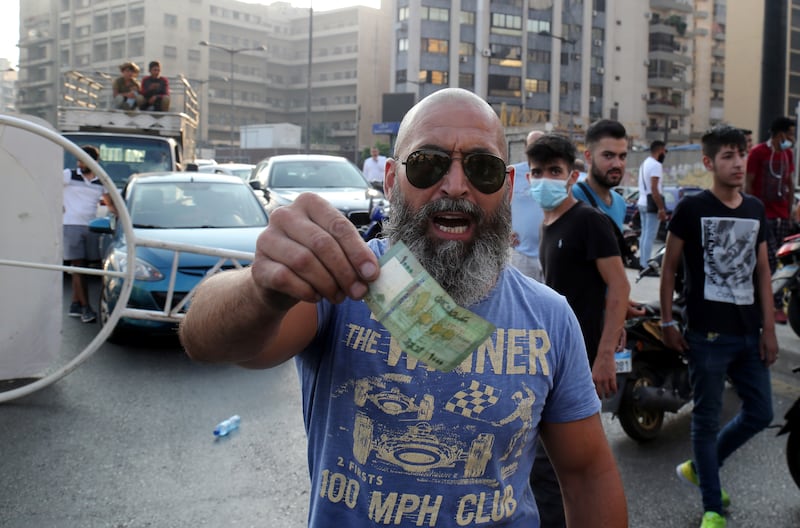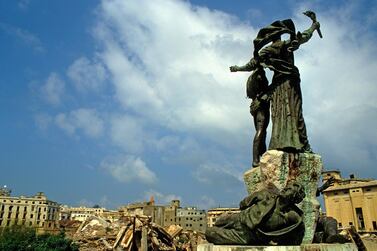The government formation process in Lebanon has hit a dead end, with the decision of prime minister-designate Saad Hariri to step down. A broader question asked by Mr Hariri and his entourage is why Hezbollah failed to put any pressure on President Michel Aoun and his son-in-law Gebran Bassil to be more flexible over accepting Mr Hariri’s draft lists of ministers.
Mr Hariri’s view is that Hezbollah in public said it wanted a government, and even mediated to reach an agreement, but did little to force Mr Aoun and Mr Bassil to accept a consensual outcome. Mr Aoun’s approval was necessary since any decree formalising a new government requires the signature of both the president and the prime minister-designate.
One reason may be that Hezbollah is not especially keen to halt Lebanon’s financial and economic slide. The Iran-backed group feels that as the situation in the country gets worse, it will be better able to exploit it to expand Iran's influence. That may well be true. But there appears to be another factor at play, and it may be a surprising one given the circumstances prevailing today.
As the Syrian regime has managed to consolidate itself in recent months – with the re-election (if it can be called that) of President Bashar Al Assad – Syria, backed by Russia, has sought to re-establish a presence in Lebanon. While Iran remains the dominant outside actor in Lebanon, the attempt by Syria and its allies to establish a presence cannot be ignored and will have an impact on the future of Lebanon.
There is a growing belief that Arab countries may see Syrian influence in Lebanon as a counterweight to Iran’s. That is not to say that Syria and Iran will enter into a confrontation, nor can Damascus realistically weaken Iran and Hezbollah. But if the Syrians can revitalise their Lebanese networks, if they can have a greater say over Lebanese affairs, this could narrow Iran’s margin of manoeuvre there, so in its decision-making, Iran would have to factor in Syrian stakes, and by extension Arab ones.
More importantly, such a process may well be backed by Russia, which hardly reassures Iran and its local proxies. There have been unconfirmed reports that the Russians have sought to reconcile some of their local Lebanese contacts with the Assad regime. Moscow’s rationale is that if Damascus can expand its power in Lebanon, Syria would be stabilised and Russia’s sway there would also grow.
In the past year, Hezbollah has seen much outside intervention in Lebanese affairs. The French tried to push an initiative to reform the economy last year, in the aftermath of the horrific explosion in Beirut port. France, together with the US, has also sought to support the Lebanese army and ensure that Lebanon’s vulnerabilities do not open the door to full Iranian hegemony. And Egypt and Qatar have also been involved in local politics or in providing aid.
For Hezbollah, anything that diminishes Iran’s dominant hold on Lebanon is unacceptable. So the party likely regards Syria as a potential rival, one with the advantage of having its own sympathisers on the ground. That may explain why Hezbollah was so reluctant to pressure Mr Aoun and Mr Bassil on a new cabinet.
Next year, a key event will have a major bearing on Syrian-Iranian ties: Mr Aoun’s term will end. The president’s primary objective is to ensure that he will be succeeded by his son-in-law. While Mr Bassil’s chances of being elected are slim, Hezbollah does not seem willing to give up on him, and this may well be explained by the dynamics with Syria.
The reason for this is that Mr Bassil’s main opponent for the presidency is Suleiman Franjieh, a politician personally close to the Al Assad family. While Mr Franjieh and Hezbollah are also allies, his presidency would go a long way towards reviving Syrian power, turning the country into a shared Syrian-Iranian interest.
Hezbollah’s only way to prevent this may be to bring Mr Bassil to office. This will not be easy, nor is it likely to succeed given that a majority in parliament, which elects the president, opposes him. Moreover, it will be difficult for Hezbollah to intimidate Syria’s allies to elect Mr Bassil if Damascus insists on Mr Franjieh.
The presidential election in 2022 may well be one between an Iranian asset, Mr Bassil, and a Syrian one, Mr Franjieh. Iran and Syria are highly unlikely to allow their ties to deteriorate though – and whatever happens Mr Assad will continue to help Iran in its confrontation with Israel. However, Iran and Syria have different priorities and Mr Assad is in desperate need of Arab funding for reconstruction, so he needs to show that regional support for him is worth it.






